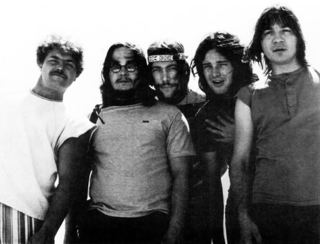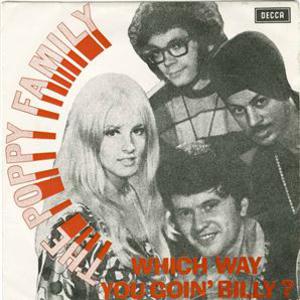Related Research Articles

The Guess Who was a Canadian rock band formed in Winnipeg, Manitoba in 1965. The band found their greatest success in the late 1960s and early 1970s, under the leadership of singer/keyboardist Burton Cummings and guitarist Randy Bachman, with hit songs including "American Woman", "These Eyes", and "No Time".

Burton Lorne Cummings is a Canadian musician. He is best known for leading The Guess Who during that band's most successful period from 1965 to 1975, and for a lengthy solo career.

54-40 is a Canadian rock band from Tsawwassen, British Columbia. The band take their name from the slogan "54-40 or Fight!", coined to express the successful expansionist agenda of James K. Polk's presidency, which was intent upon controlling a contested U.S.-Canada border area in the Oregon boundary dispute. 54-40 has had a successful career, with four of their albums being certified platinum in Canada. The band has been nominated for eight Juno Awards. Between 1996 and 2016, 54-40 were among the top 150 best-selling Canadian artists in Canada and among the top 50 best-selling Canadian bands in Canada.

The Five Man Electrical Band is a Canadian rock band from Ottawa, Ontario. They had many hits in Canada, including the top 10 entries "Half Past Midnight" (1967), "Absolutely Right" (1971) and "I'm a Stranger Here" (1972). Internationally, they are best known for their 1971 hit single "Signs".
Odds are a Canadian alternative rock band based in Vancouver, British Columbia. They were nominated for six Juno Awards in the 1990s. As of 2014, they are on their fifth record label.

Kurt Frank Winter was a Canadian guitarist and songwriter, best known as a member of The Guess Who.
The Barstool Prophets were a rock band formed in Cornwall, Ontario, in 1989 and active throughout the 1990s. The members were bassist Glenn Forrester, singer/songwriter Graham Greer, guitarist Al Morier, and drummer Bobby Tamas. In 1995, The Georgia Straight called them "one of the best guitar-rock bands to emerge in Canada since The Tragically Hip."
The Quid was a Canadian garage rock band from Winnipeg, Manitoba, active during the 1960s and 1970s.

Joey Gregorash is a Canadian singer and musician from Winnipeg, Manitoba who became the first solo Manitoba act to win a Juno Award in 1972 for Outstanding Performance-Male.

The Bells, a.k.a. The Five Bells, were a Canadian soft rock band from Montreal, Quebec, active from 1964 to 1974. They released four albums and several singles, two of which were major hits in the early 70s, "Fly Little White Dove Fly" and especially "Stay Awhile".

"Starseed" is the second single from Our Lady Peace's first album Naveed, released in 1994. It was remixed and released on the soundtrack to Armageddon. In addition, a live version from the 2003 Live album was released as a single. The song was also planned to be included on the soundtrack for Drew Barrymore's 1995 film Mad Love but was left off. Art model Saul Fox makes a brief appearance in the music video and appears on the cover of the promotional single.
Brutus was a Canadian rock band formed in 1969 and active, with interruptions, between 1969 and 1978.
Aerial was a Canadian pop and rock band from Toronto, active from 1973 to 1981.

"Greasy Jungle" is a song by Canadian rock band The Tragically Hip. It was released in November 1994 as the second single from the band's fourth studio album, Day for Night. At the time of its release, the song was the band's highest charting single ever in Canada, peaking at No. 8 on the RPM Canadian Singles Chart.
Fludd was a Canadian rock band in the 1970s. They placed six singles in the Canadian top 40 between 1971 and 1975, including "Turned 21" (1971), "Cousin Mary" (1973) and "What An Animal" (1975).. Members of Fludd went on to form the successful Canadian chart groups Goddo and Saga.

"Which Way You Goin' Billy?" is a song by the Canadian band the Poppy Family. First released as a single in 1969, it features on the album of the same name and was a chart-topping hit in Canada and Ireland. It was also a significant hit in other parts of the world, reaching #2 on both the U.S. Cash Box and Billboard pop charts.
Brother was a short-lived rock trio from Winnipeg, Manitoba, best known for the fact that all three members later joined The Guess Who. They are only known to have recorded three songs.

"Nowadays Clancy Can't Even Sing" is a song by the Canadian-American folk rock band Buffalo Springfield, released as the group's debut single in 1966. Neil Young wrote the song in Yorkville in 1965 shortly after returning from a series of performances in Toronto, during a period when his bid at a solo career had been met with little positive response. The lyrics reflect metaphorically on Young's frustration toward his stalled career in music, and was inspired by Ross "Clancy" Smith, an aberrant classmate who incited awe in his school. Commentators recognize "Nowadays Clancy Can't Even Sing" as one of Buffalo Springfield's signature songs, as well as a milestone in Young's progression as a songwriter.
The Niverville Pop Festival was a rock music festival held on an acreage southeast of Niverville, Manitoba on May 24, 1970. Held nine months after Woodstock, the festival is widely regarded as the first rock festival in Manitoba and one of the most important festivals in Manitoba rock history.
John Einarson is a Canadian rock music historian, journalist and writer from Winnipeg, Manitoba.
References
- 1 2 "Sugar & Spice". canadianbands.com. Canadian Bands. Retrieved 25 October 2021.
- ↑ "Sugar and Spice". Canuckistan Music, Michael Panontin
- ↑ "From the Music Capitals of the World". Billboard. Nielsen Business Media, Inc. 23 March 1968. pp. 48–. ISSN 0006-2510.
- ↑ "Sugar & Spice – "Not To Return" (White Whale) 1969". youtube.com. YouTube. Retrieved 25 October 2021.
- ↑ "Sugar N' Spice - I Don't Need Anything". youtube.com. YouTube. Retrieved 25 October 2021.
- ↑ "CA Sugar And Spice - Day By Day". youtube.com. YouTube. Retrieved 25 October 2021.
- ↑ "CA Sugar and Spice - It's Growin'". youtube.com. YouTube. Retrieved 25 October 2021.
- 1 2 "Off the TRACK". Winnipeg Free Press, John Einarson, 09/29/2013
- ↑ "Sugar & Spice - Cruel War". youtube.com. YouTube. Retrieved 25 October 2021.
- ↑ Nielsen Business Media, Inc. (24 May 1969). "London (Canada) Has Biggest Year in History". Billboard. Nielsen Business Media, Inc. pp. 1–. ISSN 0006-2510.
{{cite magazine}}:|author=has generic name (help) - ↑ "Canadian Content (Cancon)". RPM Volume 11, No. 3, Mar 17, 1969
- ↑ "Top Singles". RPM - Volume 11, No. 5, Mar 31, 1969
- ↑ "Dance party Dad". Winnipeg Free Press, John Einarson, 03/2/201
- ↑ "Swingin' Singles". Winnipeg Free Press, October 5, 2008, page 35
- ↑ "Sugar & Spice". manitobamusicmuseum.com. Manitoba Music Museum. Retrieved 25 October 2021.
- ↑ "RPM Top 100 Singles - October 4, 1969" (PDF).
- ↑ "Canadian Content (Cancon". RPM - Volume 12, No. 5 Sep 20, 1969
- ↑ "Niverville Pop Festival". Manitoba Music Museum. Retrieved May 7, 2020.
- ↑ "( SUGAR AND ) SPICE - Angeline - 1970 - FRANKLIN RECORDS". youtube.com. YouTube. Retrieved 25 October 2021.
- ↑ "Spice - Sweet Talking Woman". youtube.com. YouTube. Retrieved 25 October 2021.
- ↑ "RPM Top 100 Singles - March 4, 1972" (PDF).
- ↑ "Spice - Strawberry Wine". youtube.com. YouTube. Retrieved 25 October 2021.
- ↑ "RPM Top 100 Singles - April 15, 1972" (PDF).
- ↑ Brisebois, Dan. "Canadian Bands.com - Sugar & Spice". www.canadianbands.com. Retrieved 2020-07-04.